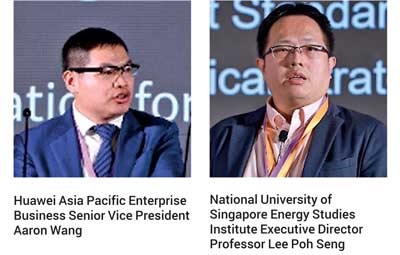Monday Feb 16, 2026
Monday Feb 16, 2026
Tuesday, 24 May 2022 01:03 - - {{hitsCtrl.values.hits}}
Huawei last week held the ‘Fast, Reliable, and Green Data Centre’ forum on the Huawei APAC Digital Innovation Conference 2022. 
Discussing how enterprises can build new generation data centres in the digital economy to cope with several challenges, such as rapid data volume growth, data protection, and low-carbon, this forum attracted over 500 customers and partners from various industries and countries in the Asia Pacific region.
In the opening speech, Huawei Asia Pacific Enterprise Business Senior Vice President Aaron Wang said in the digital economy, data is one of the core competitive edges for enterprises. As such, data centres play a critical role in helping enterprises go digital. By 2030, data volume will increase 30-fold and enter into YB era, enterprises have run into huge challenges on data governance and interconnection while also trying to lower carbon emissions.
National University of Singapore Energy Studies Institute Executive Director Professor Lee Poh Seng shared his insights about the data centre trends and challenges in the Asia Pacific region. He noted that sustainable data centre development is one of the key issues, requiring an effective sustainability reporting system to properly support carbon neutrality goals. He also highlighted the need for relevant industry standards.
He explained that on average, data centres in in Asia Pacific have a relatively high power usage effectiveness (PUE) of 1.69, above the global average of 1.59. Hence, more should be done and one possible strategy is the introduction of liquid cooling technologies. To wrap up, He summarised the four key factors in the development of new data centres: service acceleration, sustainable development, data security, and innovation.
In the IT innovation part, Futurewei senior storage expert Bill Raftery showcased Huawei’s OceanStor all-flash acceleration solution, which uses flash-to-flash-to-anything (F2F2X) to help customers expedite production transactions, analyse high-performance backup and recovery data in real time, and otherwise innovate. In particular, he mentioned the unique advantages of Huawei’s wide product portfolios. For example, the NOF+ solution for storage and IP networks replaces the conventional FC network, and the SOCC solution for storage and optical networks implements quick failover between data centres within seconds. These innovations are closely related to Huawei’s continuous R&D investment in the ICT field.
In the Network innovation part, based on a study commissioned with Forrester consulting, while many decision-makers have begun to experiment with partially or fully implemented DCN automation at their enterprises, there are still certain misconceptions regarding the process. Maturity level is also low under multicloud and multivendor conditions. Decision-makers need to introduce new technologies, tools, processes, as well as integrated application and O&M solutions to achieve a higher automation level.”
Huawei’s Chief Data Centre Architect Philip Lai introduces multiple solutions, such as L3.5 autonomous driving network (ADN) and WDM transmission Data Centre Interconnect (DC OptiX). It uses advanced technologies like AI to create intelligent connectivity, deploying network self-organisation, repair, and optimisation. Ultimately, these actions lead to a simplified network architecture, high performance, intelligent O&M, and cost reduction.
In the Green Data centre part, Huawei Digital Power Vice President Sun Xiaofeng introduced Huawei’s next-gen simplified, green, intelligent, and secure data centre infrastructure solution. The new solution integrates several innovations, including a reconstructed architecture, temperature control, O&M, and power supply. Huawei FusionDC uses pre-configured modules to roll out large-scale DCs in just six to nine months, reducing carbon emissions by 90%. For small- and medium-sized DCs, Huawei FusionModule adopts a modular and intelligent model to deliver high integration, plug-and-play, and remote, centralised O&M.
In the future, Huawei will continue innovating, focusing on software and hardware convergence as well as cross-product-domain collaboration. Huawei will strive to provide industry-leading fast, reliable, and green full-stack data centre solutions, collaborate with partners to help enterprises achieve digital transformation and seize opportunities in the digital era.